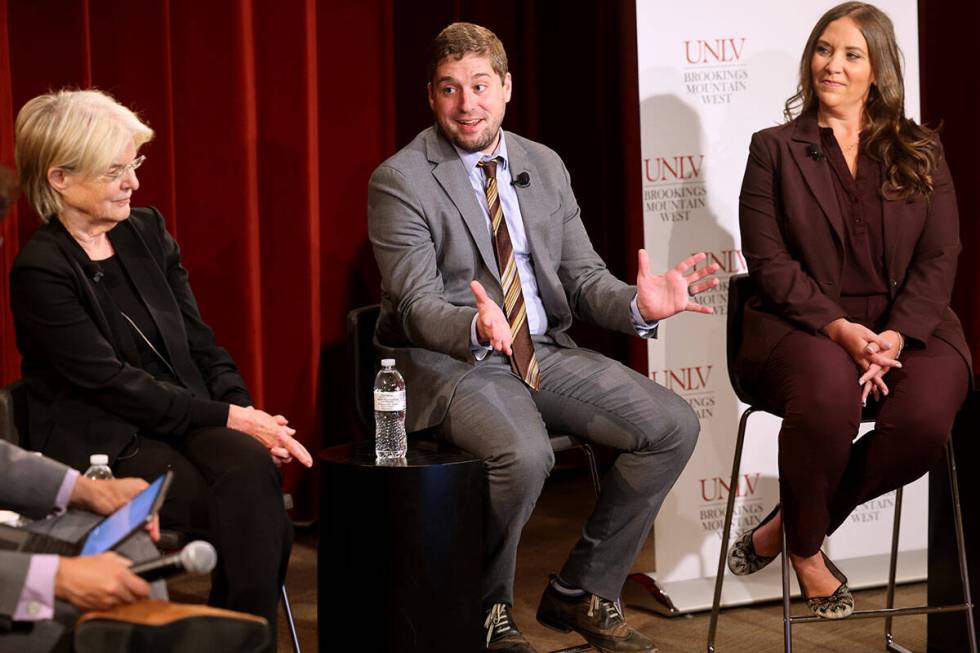‘This is a problem’: Government officials admit Las Vegas is in a housing crisis

Half of the Las Vegas Valley has been priced out of the real estate market, as the region has a serious shortage of affordable housing, according to a top Clark County housing official.
“We see that gap as being as high as 80,000 units for folks below the area median income,” Dagny Stapleton, a community housing administrator for Clark County, said during a Monday panel at UNLV’s Lied Center for Real Estate on Nevada’s residential real estate landscape. “We need money and we need land.”
Affordability has become a top issue for Las Vegas Valley residents as the region finds itself in the middle of a housing crisis caused by a number of issues, the biggest a lack of developable land, according to real estate stakeholders. According to a study from Bankrate, the average Nevada household needs to make $111,000 a year to afford a mortgage, a 56 percent increase from four years ago, and home prices are close to breaking record highs set coming out of the pandemic. Home prices have increased close to 40 percent since 2020, according to the Freddie Mac House Price Index of Appreciation.
The federal government controls approximately 88 percent of the land within Clark County and has been slow to release it since Congress passed a land management act in 1998.
Clark County has now pumped hundreds of millions of dollars into affordable housing projects over the past few years via various programs, but the issue has only gotten worse. The county’s website said that as of May there are close to 5,000 units of affordable and supportive housing in the pipeline via approximately $200 million in funding.
Las Vegas Valley residents would have to save for 17 years to afford a down payment for a house right now, according to a recent study from Zillow, so Stapleton said many of their programs aim to help get valley residents into the housing market via financial support.
How did we get here?
The pandemic kicked off an unprecedented shift in the housing market and a new round of quantitative easing, said Aaron Klein, a senior fellow and Miriam K. Carliner Chair in economic studies at The Brookings Institution and guest speaker at the UNLV event. Klein explained how the Federal Reserve buying an unprecedented amount of mortgage-backed securities during the height of the pandemic has become a key driver for housing inflation.
While inflation has dropped since a peak of 7 percent in 2021 and now sits at around 2.5 percent, housing costs, mortgage and rental rates still remain elevated, and Klein said this has put the U.S. in a unique position globally as the Federal Reserve owns approximately $2.3 trillion in mortgage-backed securities, about a third of the overall market.
“Inflation is global, but housing inflation is uniquely American,” he said, noting that the valley led the country at one time in new home construction. “Las Vegas is an outlier, no city in America did more to build more housing units from 1990 to 2013, and guess what, it worked.”
David Sanchez, acting chief of staff for the U.S. Department of Housing and Urban Development, also a panelist at the event, admitted the housing crisis is one they are well aware of.
The federal government has pumped billions of dollars into various housing initiatives across the country over the past few years, including $5.5 billion in grants for affordable housing, but home prices nationally have outpaced previous time periods since the onset of the pandemic and hit a record high in June.
“We know these are problems. We know that we have a housing supply shortage that is now engulfing the vast majority of the country,” Sanchez said. “So here we are and we have a problem and we need to address it.”
Gov. Joe Lombardo has written twice to President Joe Biden this year asking him to streamline the process for releasing federal land, and in July, the Accelerating Appraisals and Conservation Efforts Act, sponsored by U.S. Rep. Susie Lee, D-Nevada, passed the House and the legislation was endorsed by Lombardo.
The crux of the bill looks to “tackle federal appraisal bottlenecks” and streamline the appraisal process for land in the valley, which is handled by the Department of the Interior’s Appraisal and Valuation Services and relies heavily on private appraisers.
Contact Patrick Blennerhassett at pblennerhassett@reviewjournal.com.